

Jun 30, 2022
CAREER & LIFEThe story behind auto component manufacturer DENSO’s pursuit of software innovation, and a look at the engineers who support it
The Career Innovation Program: helping software engineers develop their own career
For many years now, DENSO Corporation has focused primarily on the manufacture of in-vehicle components and systems that bolster the reliability of automobile products and provide greater peace of mind to society. Now, as the auto industry and the society-wide business ecosystem as a whole undergo major changes, the Company is pursuing Software innovation and providing support for career development for software engineers in order to realize a new mobility-centered society that takes consideration of the environment and peace of mind in order to inspire. Let’s take a look at how DENSO is striving to achieve these.
-

Software Innovation Dept.Kenzo Yano
Kenzo Yano joined DENSO in 1984, initially working in powertrain-use electronic control unit planning, advanced development and mass-production design. In 2010, he was sent to DENSO AUTOMOTIVE Deutschland GmbH in Germany where he took in charge of DENSO European Engineering operations overall. In 2018, Yano became deputy business unit head of Electronics Business Unit in DENSO Japan, and then responsible for the Group’s Software Innovation Dept. in 2020.
-

Electronics Platform & Software Function UnitSatoshi Hirose
Satoshi Hirose joined DENSO in 1990, moved to DENSO CREATE in 1991 when that company was founded, and worked there on the development of in-car embedded software. From 2015 he served as one of the leaders in DENSO CREATE reforms, overseeing human resources and related training systems as well as structural reforms. Hirose was appointed as human resources management improvement leader in 2019 to supervise software reform and innovation activities at DENSO, and in July 2020 he returned to DENSO’s head office when the Software Career Development Dept. was established.
Contents of this article
Strengthening software development capabilities, an increasingly important factor in the CASE era
For seventy-three years since its founding, DENSO has been an important global automotive component manufacturer that has created cutting-edge technologies, systems and products. Through these products and services, the Company has pursued a more prosperous mobility-related society for the sake of future generations. DENSO believes that digital transformation (DX), which is currently a popular approach, along with the CASE (connected, autonomous, shared and services, and electric) approach unveiled by Daimler in 2016, are both key.
Kenzo Yano, senior advisor in DENSO’s Software Innovation Dept., describes DENSO’s role as follows: “The CASE approach is not concerned with the auto industry alone. It aims to synchronize the efforts of all mobility-related companies around the world in order to transform society’s overall business ecosystem in terms of how people and things are transported. Therefore, CASE is having some big impacts.”
In the coming CASE era, DENSO aims to provide green (environmentally friendly) performance and peace of mind in order to make people happier. Contributing to society with a focus on the two central ideals of “green” and “peace of mind” serves as the basis of corporate activities moving forward, and by ensuring that everyone can benefit from these efforts, anywhere and anytime, the Company hopes to inspire people throughout mobility-centered society, respecting end-user experiences.
Using new mobility services, DENSO aims to provide tangible new value in people’s day-to-day lives through levels of convenience and services not possible with discrete automobile products alone.
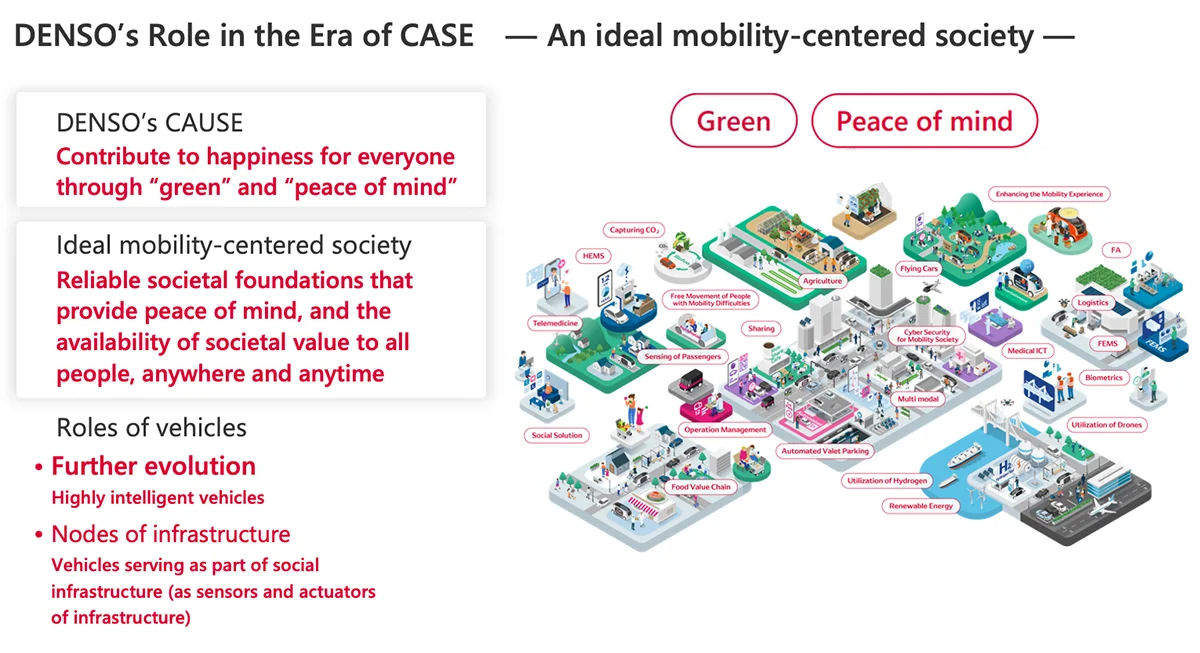
When envisioning the ideal mobility-oriented society based on this sort of vehicle-centered ecosystem, it’s clear that reliable societal foundations are necessary. That’s why DENSO, a company which has developed many high-quality, highly reliable technologies over its many years in business, has, in Yano’s words, “Aimed to become a Tier 1 supplier for the mobility-oriented society, which means providing societal platforms as the foundation for such a society. Hardware, such as the cars that people use, is important, but the true source of new-value creation is software, which is a vital aspect of the overall equation.”
Today, new players in the industry such as Tesla are rapidly bolstering their corporate value and presence, while IT and software firms such as Google and Sony are entering the auto industry as new competitors and as cooperative partners. Meanwhile, companies such as DENSO which have detailed knowledge and experience in the auto industry are outfitting vehicles with a wide variety of new products and services, continually optimizing the very platforms themselves using new technologies. “This is what’s helping the mobility-oriented society evolve more rapidly in the right direction,” says Yano.
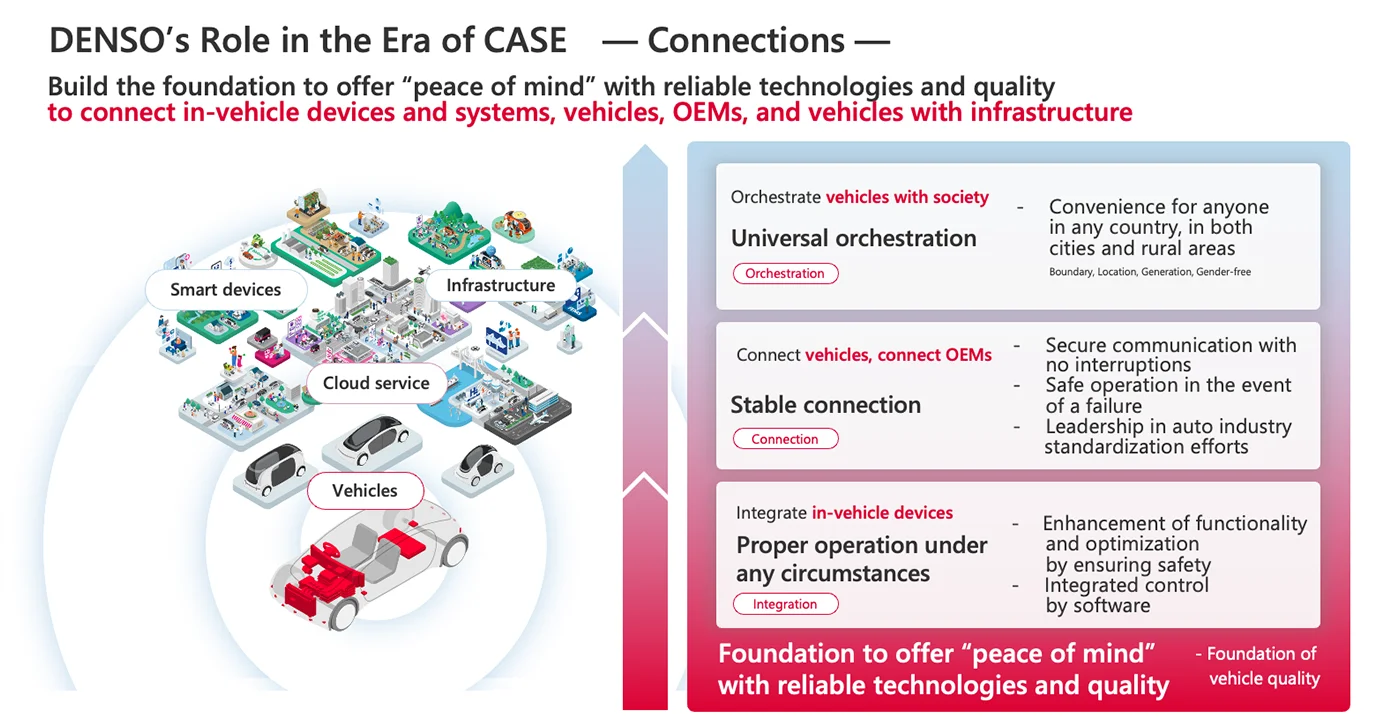
In these ways, DENSO is using the CASE era as an opportunity to change its role in big ways. As Yano points out, “With CASE, the ‘C’ [connected] aspect provides the chance to connect cars with the rest of society. Meanwhile, well-balanced efforts in the ‘A,’ ‘S’ and ‘E’ [autonomous, shared and services, and electric] areas are also demanded of us, and the importance of software is growing in all four of these areas.”
Take the “E” of CASE, for example: countries around the world are changing their strategies to promote electric vehicles, and industry structures and energy supply frameworks are being transformed as a result. This is having major impacts on the approaches of the many people traditionally involved in manufacturing internal-combustion-type vehicles.
Amid these changes, the various players in the manufacturing industry must collaborate with government and academia in order to optimize the society-wide electrification of vehicles. This means optimizing energy usage in automobiles as well as making good use of map-related technologies, sensor-based information and the like in order to achieve automated avoidance of traffic congestion and thus improve energy efficiency. To these ends, big-data analysis is necessary, and in this area the advantages of digital technologies and software are indispensable.
DENSO’s Career Innovation Program in support of software engineer career development
For DENSO, strengthening software-related capabilities is a priority management issue—“software innovations” is listed specifically in the Company’s FY2019 management policy. Furthermore, the Company has appointed a chief software officer (CSwO) and, in January 2021, established the new Software Innovation Dept. under the direct supervision of the president.
At DENSO, “software innovation” refers to improving and broadening software engineers’ skills. It’s also necessary to ensure that these software engineers are assigned optimal roles so that they can make good use of their newly improved skills. To these ends, DENSO is improving and expanding the relevant frameworks and systems.
“We are pursuing innovations and improvements centered on the two pillars of software engineer career development support and HR information DX platform building,” says Yano. “Each engineer has their own personal career path in mind and feels that certain environments and conditions are necessary in order to achieve it. That’s why we are providing individualized support for every engineer so that they can pursue their preferred career and cultivate more advanced and wide-ranging skills.”
For automotive software, development is carried out jointly with vehicle manufacturers (OEMs) on a domain-by-domain basis, meaning it is done separately for the cockpit, for the engine, and so forth. In contrast, software development for a mobility-oriented society is larger in scale, more complex, and more challenging. Satoshi Hirose, general manager of the Electronics Platform & Software Function Unit’s Software Career Support Dept., adds a few words: “In order to make contributions to society through the ‘C’ of CASE—‘connected’ technologies—we are switching to a cross-domain development approach. Moreover, because we are shifting efforts in some areas from the sale of physical products to the sale of services and other non-tangible things, we cannot remain competitive if we stick with our old software development approaches.”
“In the past, DENSO focused on cultivating engineers with the skills necessary to work in mechanically-focused, mature fields. Moving forward, we will need to train engineers to work in software-rich growth fields instead. This will mean making use of the skills and know-how we have already developed while cultivating more diverse skill sets and fostering more highly capable software engineers.”
DENSO’s Career Innovation Program (CIP) program helps software engineers to develop their careers. It comprises four elements: the “Sommelier” certification system, which helps employees to better understand their own abilities; the recurrent training program to equip members with necessary knowledge; a role assignment process that provides people with optimal opportunities to utilize their skills; and a “buddy framework” which fosters practical skills.
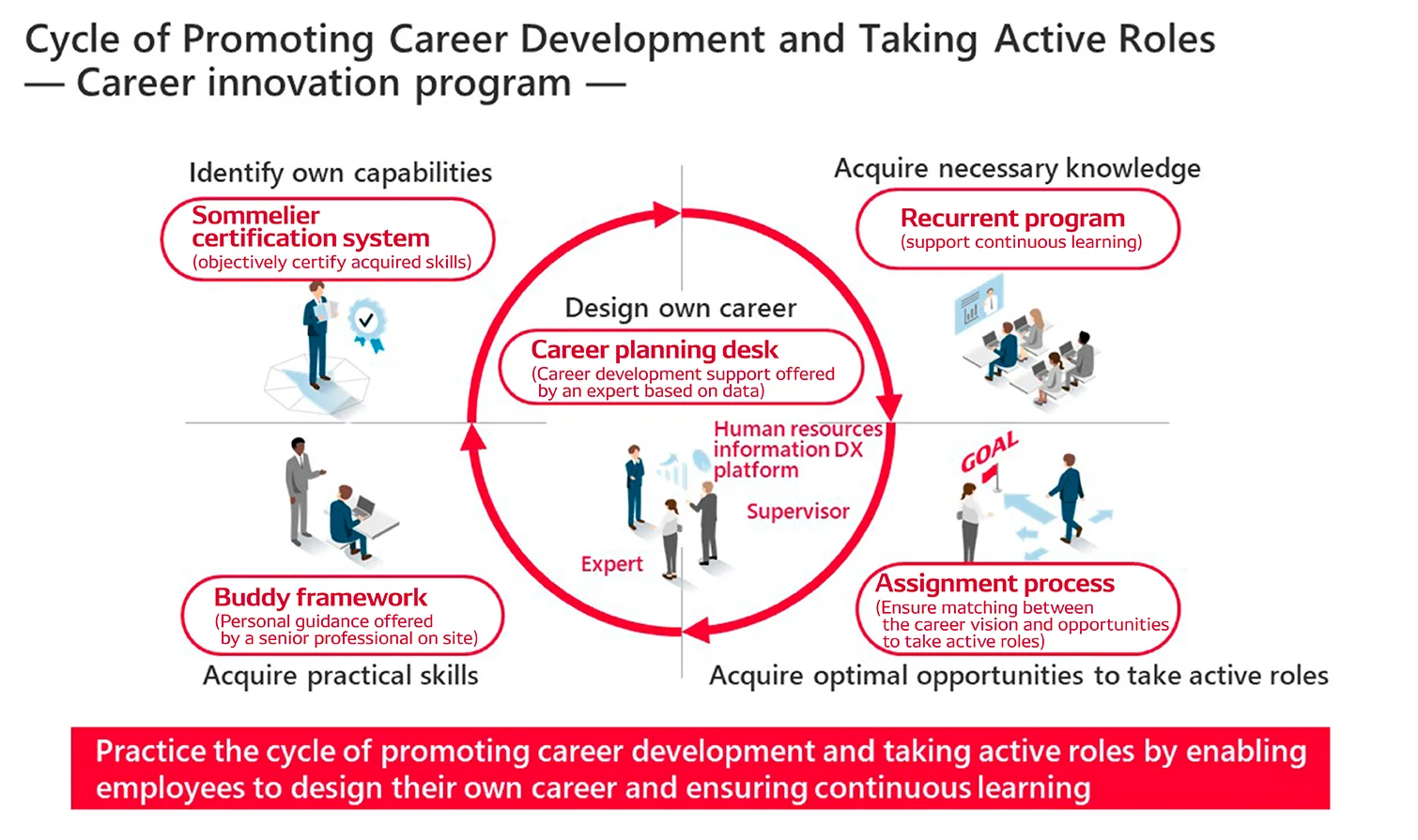
Employees first utilize the Sommelier certification system, which provides explicitly understandable representations of software engineering skills as well as a clear understanding of the skills that engineers will need to acquire. The recurrent training program serves as a systematic framework for developing skills that need to be improved, and because these skills have no true meaning unless they are put into practice, an assignment process is used to deploy personnel to roles where they can apply their skills and achieve the best possible growth. Lastly, engineers receive practical guidance from certified professionals in the workplace via the buddy framework in order to develop useful skills and abilities. After all of this, the worker is certified at a new level within the Sommelier system.
The Sommelier certification system comprises 17 different specifically defined capabilities such as “architect” and “project management,” all relating to the skills required of systems engineers and other types of software engineers. With the goal of networked cyber-physical systems (CPS), we aim to accomplish everything ranging from business and service creation to cultivation of system and requirement definitions, implementation, advanced research, and development support environments, and then define the necessary job roles.
In addition, a Career Planning Desk, staffed with highly experienced members capable of offering valuable advice, has been established to provide wide-ranging career support. A centralized HR information DX platform is also used to store and organize information on the careers and available skills of in-house employees.
Comments Hirose, “I am very grateful that we have been able to bring together HR data in this way through the information platform. This type of digital platform is invaluable for helping us improve our competitive strength as a company, too.”
Doing things because you want to, not because you have to
The recurrent training program is not only for people with software development experience. It’s intended for those without experience as well, providing an opportunity for hardware engineers to switch career paths as well as a good way to start learning the C programming language.
Because automotive software development at DENSO has focused primarily on embedded-type software in the past, trainees spend about three months learning the fundamentals of embedded software development using CPU boards, as well as waterfall-model development and agile development processes, in order to get an understanding of operations overall. After this, they engage in programming work under the guidance of experienced personnel, taking about three years to gain the experience necessary to stand on their own as programmers. In addition to this career-change training program, there is a wide range of training options for skills in other fields.
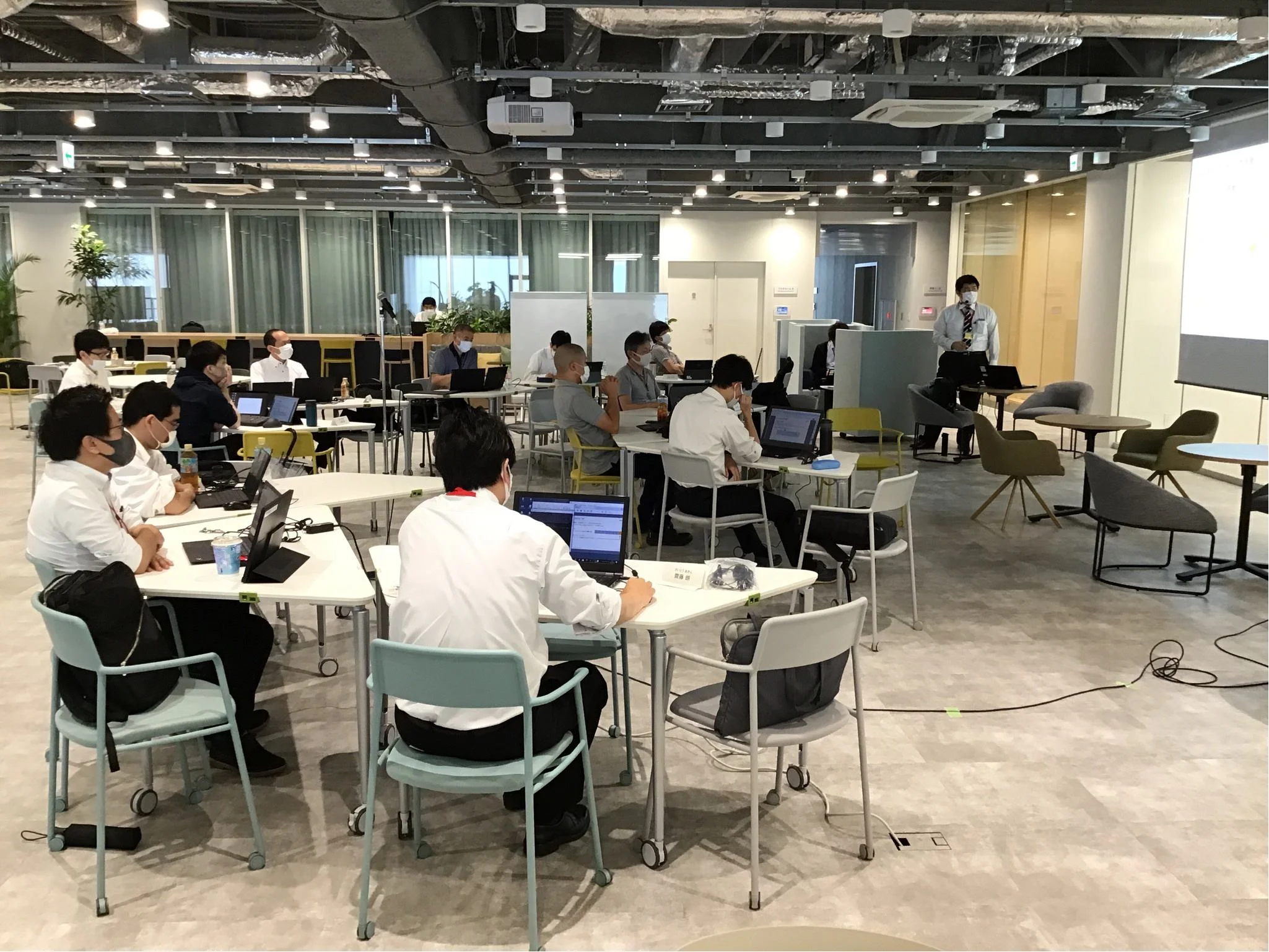
Additionally, DENSO holds coding contests to raise motivation in programming and give employees more firsthand experience with software. These are carried out as part of software engineer interpersonal exchange events and consist of competitions to come up with solutions to programming problems. These competitions have been improved by introducing multiple categories rather than restricting them to specific programming languages, thus enabling beginners to join in more easily.
In response to Covid-19 restrictions, event formats have been tweaked and competitions held remotely, resulting in a fourfold increase in participants for FY2020.
There are also “cloud contests,” which are fun and lighthearted events that inspire greater enthusiasm in employees and promote independent learning. During these contests hosted by Amazon Web Services (AWS), participants compete to achieve the quickest responses to cloud system malfunctions, and in FY2020 DENSO employees took part for the first time. A total of 230 employees participated, including the chief technology officer (CTO) and CSwO, and some won prizes.
Doing things because you want to, not because you were ordered to, leads to greater growth,” explains Hirose. “That’s why it’s important to inspire employees to approach things in a more playful, lighthearted way. We encourage greater awareness of individual career paths in each employee and proactive career building. Management does not simply complete the tasks set before them; instead, they provide support for employees in order to promote positive, forward-looking career building. This style is increasingly becoming the norm in DENSO’s corporate culture.”
CIP support for growth among one thousand engineers by 2025
“By completing the CIP, we have laid the foundations for growth and support, and by making good use of this program we expect to see increasingly impressive results,” says Yano. “More than 100 engineers have already taken part in CIP training, and some of them have changed the course of their career to focus on software-related business. By promoting further career changes and through outside hires, we aim to help approximately 1,000 people grow as software engineers [through this program] by 2025. We have now laid the groundwork necessary for accomplishing this task.”
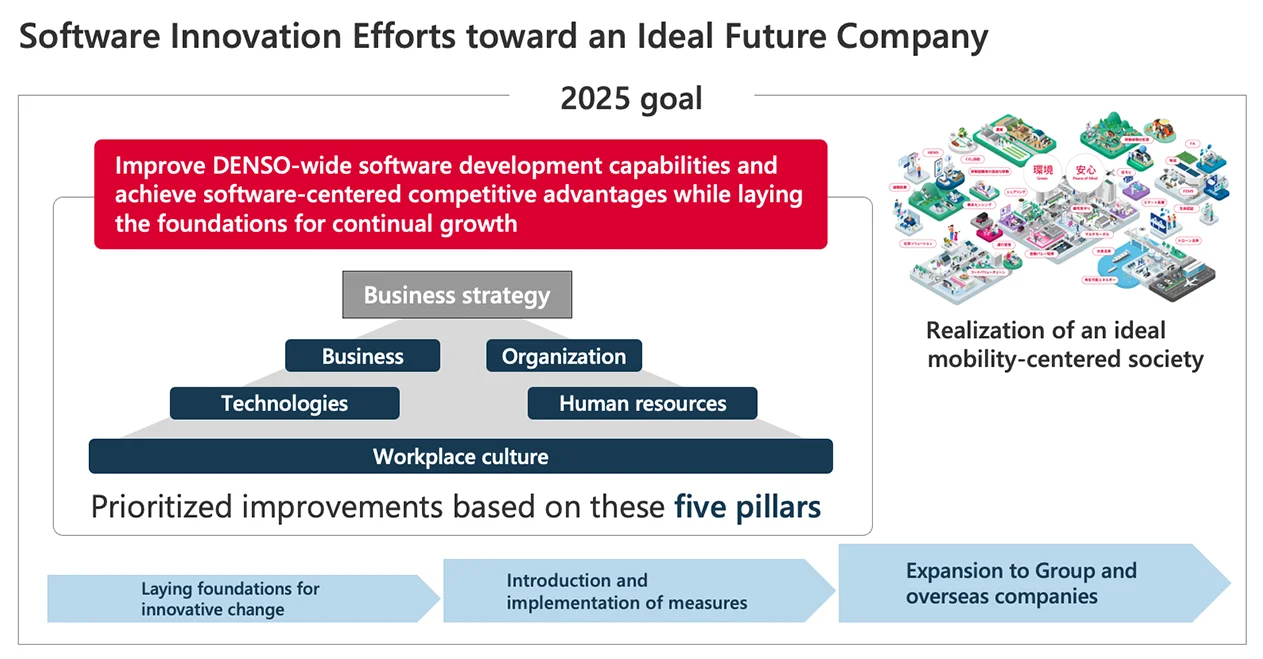
DENSO’s 2025 goal is to improve software development capabilities throughout the DENSO group companies' wide organization as a whole and achieve software-centered competitive advantages while laying the foundations for continual growth. To this end, they are laying the groundwork by prioritizing innovating change centering on the five main business-strategy pillars of business, organization, technologies, human resources, and workplace culture, which together form the core of the Company’s overall management strategy.
With a near-future FY2022 target, DENSO is introducing systems, expanding their utilization, and also working to improve software development throughout the entire Group and other countries around the globe.
REACTION
Changing your "Can'ts" into "Cans"
Where Knowledge and People Gather.




Leave a comment